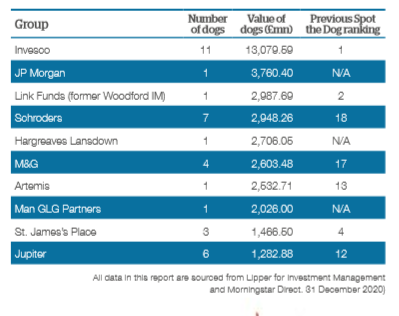
Investors have £43.9 billion languishing in underperforming funds, according to the latest Spot the Dog report by fund supermarket Bestinvest.
The bi-annual study names and shames the funds that have underperformed their benchmark by 5% or more over the past three years. Some 91 funds make the latest list of dog funds, up from just 51 funds six months ago.
The amount held in the so-called "dog" funds has climbed from £32.6 billion to £43.9 billion since the last report, and investors are shelling out £410 milliona year in fees to hold these funds.
Invesco has 11 funds in the doghouse, with total assets of more than £13 billion between them. It is the fourth time in a row that Invesco has topped the list.
A number of firms have manage to escape the list entirely this time round after featuring in previous editions - Aberdeen, Blackrock, Fidelity and Janus Henderson. They have been replaced, however, by JP Morgan, Schroders, Hargreaves Lansdown, M&G and Jupiter.
While 22 UK funds feature in the list, 41% of their assets sit in Mark Barnett's Invesco High Income and Invesco Income funds, both Negative-rated by Morningstar analysts, and the Neutral-rated Invesco UK Strategic Income.
The Invesco High Income fund, in particular, suffered outflows of £1.8 billion during 2019. Morningstar analysts raised concerns about the fund’s small cap exposure and downgraded it to a Neutral rating in November.
Bestinvest says: “Barnett’s funds have suffered in part due to a heavy exposure to unloved, domestically-focused UK companies, as well as some stock specific disappointments. The funds have also had to deal with the challenge of significant outflows at a time when the manager has been reducing exposure to less liquid holdings.”

Source: Bestinvest
It will be of little surprise to many investors that the Negative-Rated LF Equity Income fund, formerly known as LF Woodford Equity Income, is in the doghouse. The fund first featured on the list of dog funds last year after a poor run of performance.
The fund is currently in the process of being wound up, and investors received the first tranche of their money back last month, some seven months after the fund suspended trading. Bestinvest says: “Following its fall from grace, this now infamous fund is in the process of being wound-up, leaving beleaguered investors staring at steep losses.”
The £1 billion St James's Place UK High Income fund is also on the dog list this year. The fund had been run by Neil Woodford until last summer, when he was removed as manager and the mandate given jointly to RWC and Threadneedle.
Not all funds in the UK All Companies sector have underperformed, however. Bestinvest's list of top performing "pedigree picks" include the Bronze-rated LF Lindsell Train UK Equity Income and the five-star rated TB Evenlode Income – which have delivered a three-year annualised return of 12.6% and 12.4% respectively.
US Funds in the Doghouse
The US is home to the highest proportion of dog funds, accounting for 30% of the list, followed by Europe (19%). Among the perennial underperformers of the North America sector are the three-star rated VT De Lisle America and Neutral-rated Fidelity American Special Situations – which have lagged their Morningstar category over three years by 5.2 percentage points and 3 percentage points respectively. Meanwhile in Europe, the two-star rated Invesco European opportunities and one-star rated Merian European Equity (Ex UK) have been the weakest performers.
A St. James’s place spokesperson says: “We continually assess our managers and are well positioned to make changes when appropriate, as shown last year with the UK High Income fund and, more recently, with the Global Emerging Markets fund.”
An Invesco spokesperson says: “Since the general election we have seen some evidence that markets are beginning to value UK companies on the basis of their long-term fundamentals. […] We expect volatility to continue while the UK negotiates a trade deal with the EU and as global economic headwinds persist. We retain full confidence in the positioning of our UK equity portfolios.”
An M&G spokesperson says: “We are disappointed to be included in the report and acknowledge the challenging performance across four of our equity funds. In the case of the M&G Recovery Fund, it has a distinct, contrarian approach buying unloved companies and working with management to improve the underlying business, a style that has been out of favour with UK equity markets of late.”




























